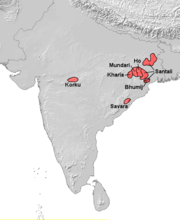
Korku language
Encyclopedia

Korku
Korku is a scheduled tribe community predominantly found in the East Nimar , Betul and Chhindwara districts of Madhya Pradesh and adjoining areas in Melghat region of Maharastra in India speaking the Korku language, which is a member of the Austroasiatic language family...
tribe of central India
India
India , officially the Republic of India , is a country in South Asia. It is the seventh-largest country by geographical area, the second-most populous country with over 1.2 billion people, and the most populous democracy in the world...
. It belongs to the Kolarian or Munda
Munda languages
-Anderson :Gregory Anderson's 1999 proposal is as follows. Individual languages are highlighted in italics.*North Munda **Korku**Kherwarian***Santhali***Mundari*South Munda **Kharia–Juang***Juang***Kharia...
family, isolated in the midst of a Dravidian
Dravidian languages
The Dravidian language family includes approximately 85 genetically related languages, spoken by about 217 million people. They are mainly spoken in southern India and parts of eastern and central India as well as in northeastern Sri Lanka, Pakistan, Nepal, Bangladesh, Afghanistan, Iran, and...
(Gondi
Gondi language
Gondi is spoken by the Gondi people. It is a Central-Dravidian language, spoken by about two million people chiefly in the states of Madhya Pradesh, Gujarat, Andhra Pradesh, Maharashtra, Chhattishgarh and in various adjoining areas of neighbouring states...
) population. The Korkus are also closely associated with the Nihali people, many of whom have traditionally lived in special quarters
Ghetto
A ghetto is a section of a city predominantly occupied by a group who live there, especially because of social, economic, or legal issues.The term was originally used in Venice to describe the area where Jews were compelled to live. The term now refers to an overcrowded urban area often associated...
of Korku villages. Korku is spoken by approximately 478,000 people, mainly in four districts of southern Madhya Pradesh
Madhya Pradesh
Madhya Pradesh , often called the Heart of India, is a state in central India. Its capital is Bhopal and Indore is the largest city....
(Khandwa
Khandwa District
Khandwa District , formerly known as East Nimar District, is a district of Madhya Pradesh state in central India. The city of Khandwa is the administrative headquarters of the district.-Geography:...
, Harda
Harda District
Harda District is a district of Madhya Pradesh state of central India. The town of Harda is the district headquarters. The district is part of Bhopal Division....
, Betul
Betul District
Betul District is a district of Madhya Pradesh state in central India. The city of Betul serves as its administrative headquarters. The district is a part of Narmadapuram Division.-Demograpics:...
, Hoshangabad
Hoshangabad District
Hoshangabad District is one of the districts of Madhya Pradesh state of India, and Hoshangabad town is the district headquarters.-Geography:...
) and three districts of northern Maharashtra
Maharashtra
Maharashtra is a state located in India. It is the second most populous after Uttar Pradesh and third largest state by area in India...
(Rajura and Korpana tahsils of Chandrapur district
Chandrapur District
Chandrapur District is a district in Nagpur Division of the Indian state of Maharashtra.It is located at the boundary of Andhrapradesh. The district was formerly known as Chanda District. In 1964, it was renamed as Chandrapur. It was the largest district in India until it was split into the...
, Manikgarh pahad area near Gadchandur
Gadchandur
Gadchandur is a city and tehsil in Chandrapur district, Maharashtra, India.Gadchandur is named after the fort Chandur. It was mostly ruled by gond kings.-Location:...
in Chandrapur district
Chandrapur District
Chandrapur District is a district in Nagpur Division of the Indian state of Maharashtra.It is located at the boundary of Andhrapradesh. The district was formerly known as Chanda District. In 1964, it was renamed as Chandrapur. It was the largest district in India until it was split into the...
) (Amravati
Amravati district
Amravati district is a district of Maharashtra state in central India. Amravati is the administrative headquarters of the district.The district is situated between 20°32' and 21°46' north latitudes and 76°37' and 78°27' east longitudes. The district occupies an area of 12,235 km²...
, Buldana
Buldhana district
-Buldhana district is a district in the Amravati division of Maharashtra state in western India. It is situated at the westernmost border of Vidarbha region of Maharashtra and is 500 km from the state capital, Mumbai...
, Akola
Akola District
Akola is a district in the Indian state of Maharashtra. The city of Akola is the district headquarters. Akola district forms the central part of Amravati Division, and was a former British Raj Berar Province.Area of the district is 5,431 km²...
). Korku is spoken in a reducing number of villages and is gradually being replaced by Hindi
Hindi
Standard Hindi, or more precisely Modern Standard Hindi, also known as Manak Hindi , High Hindi, Nagari Hindi, and Literary Hindi, is a standardized and sanskritized register of the Hindustani language derived from the Khariboli dialect of Delhi...
.
Nouns may have either one of the three genders: masculine, feminine or neuter. Adjectives are placed before the nouns they qualify.
Further reading
- Nagaraja, K. S. (1999). Korku language: grammar, texts, and vocabulary. Tokyo: Institute for the Study of Languages and Cultures of Asia and Africa, Tokyo University of Foreign Studies.
- Zide, N. H. (1963). Korku noun morphology. [Chicago: South Asian Languages Program, University of Chicago.
- Zide, N. H. (1960). Korku verb morphology. [S.l: s.n.

